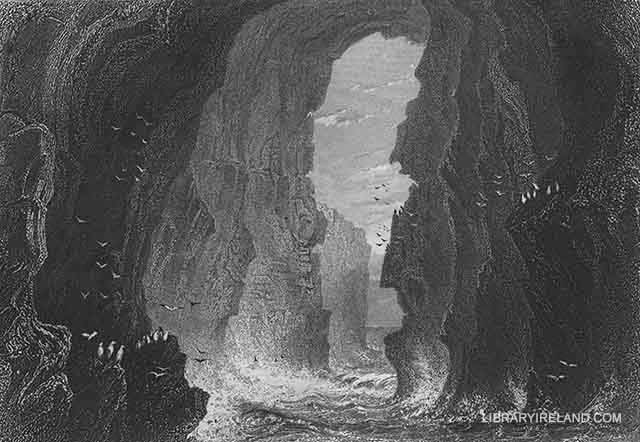Cave of Dunkerry, County Antrim
West of the Causeway lie one or two very remarkable caves, one of them accessible both by land and sea, the other, the CAVE OF DUNKERRY, accessible by water only. The entrance to the latter assumes the appearance of a pointed arch, and is remarkably regular. The boatmen are singularly expert in entering these caves. They bring the boat's head right in front, and, watching the roll of the wave, quickly ship their oars, and float in majestically upon the smooth heave of the sea. The depth of Dunkerry Cave has not been ascertained, for the extremity is so constructed as to render the management of a boat there impracticable and dangerous. Besides, from the greasy character of the sides of the cave, the hand cannot be serviceable in forwarding or retarding the boat. Along the sides is a bordering of marine plants, above the surface of the water, of considerable breadth. The roof and sides are clad over with green confervae, which give a very rich and beautiful effect; and not the least curious circumstance connected with a visit to this subterraneous apartment is the motion of the water within. It has been frequently observed that the swell of the sea upon this coast is at all times heavy; and as each successive wave rolls into the cave, the surface rises so slowly and awfully that a nervous person would be apprehensive of a ceaseless increase in the elevation of the waters until they reached the summit of the cave. Of this, however, there is not the most distant cause of apprehension, the roof being sixty feet above high-water mark. The roaring of the waves in the interior is distinctly heard; but no probable conclusion can be arrived at from this as to the depth. It is said, too, that the inhabitants of some cottages, a mile removed from the shore, have their slumbers frequently interrupted in the winter's nights by the subterranean sounds of Dunkerry Cave. The entrance is very striking and grand, being twenty-six feet in breadth, and enclosed between two natural walls of dark basalt; and the visitor enjoys a much more perfect view of the natural architecture at the entrance, by sitting in the prow with his face to the stern as the boat returns.
Of the other cave an agreeable writer, whom we have before quoted, says: "When the day is fine, and the sun shining in all its lustre, it is truly a grand and interesting sight. The sublime massiveness of the surrounding rocks—the curious stainings and colours of the sides of the roof—the musical cadence of the echoes —the dark mysteriousness of its retiring recesses, contrasted with the brilliancy of all without, and the slow, solemn heave of the translucent water, bearing idly on its surface the purple sea-star, and revealing, fathoms deep below, multitudinous vegetations covering its rocky bottom. I do not wonder that mythology peopled such caverns with naiads, and goddesses, and tritons, nor did I cease to expect that our communicative guide would be able to annex to such a spot as this some legendary lore. At the same time, I confess I did not find him in this instance quite fortunate. To be sure, he told us how two bold sea-captains, by name Willoughby and Middleton, not content with listening to the manifold echoes of a common musket, must needs bring into this cavern a six-pounder, and how, on discharging it, an immense mass of the roof fell in, whereby their lives were placed in imminent peril. He also told us of a piper who, one day, when the tide was out, wandered into the furthest recesses, no doubt curious to ascertain, in these secret solitudes, the peculiar sound of his romantic instrument. Engaged in the delights of his sweet craft, he wandered on and on, none could tell whither, for he never came out; nor were there ever any tidings of him, save that while the people were at prayers in the church of Ballintoy, and just as the clerk was about giving out the first Psalm, the sound of bagpipes was heard underground, and tunes were recognised rising up from beneath, which were rather unsuitable to the solemnity of the place."
END OF CHAPTER V.

